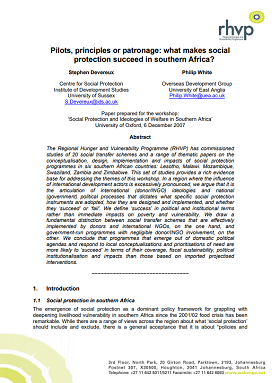Pilots, principles or patronage: what makes social protection succeed in southern Africa?
The Regional Hunger and Vulnerability Programme (RHVP) has commissioned studies of 20 social transfer schemes and a range of thematic papers on the conceptualisation, design, implementation and impacts of social protection programmes in six southern African countries: Lesotho, Malawi. Mozambique, Swaziland, Zambia and Zimbabwe. This set of studies provides a rich evidence base for addressing the themes of this workshop. In a region where the influence of international development actors is excessively pronounced, we argue that it is the articulation of international (donor/INGO) ideologies and national (government) political processes that dictates what specific social protection instruments are adopted, how they are designed and implemented, and whether
they ‘succeed’ or ‘fail’. We define ‘success’ in political and institutional terms rather than immediate impacts on poverty and vulnerability. We draw a fundamental distinction between social transfer schemes that are effectively implemented by donors and international NGOs, on the one hand, and government-run programmes with negligible donor/INGO involvement, on the other. We conclude that programmes that emerge out of domestic political agendas and respond to local conceptualisations and prioritisations of need are more likely to ‘succeed’ in terms of their coverage, fiscal sustainability, political institutionalisation and impacts than those based on imported projectised interventions.



